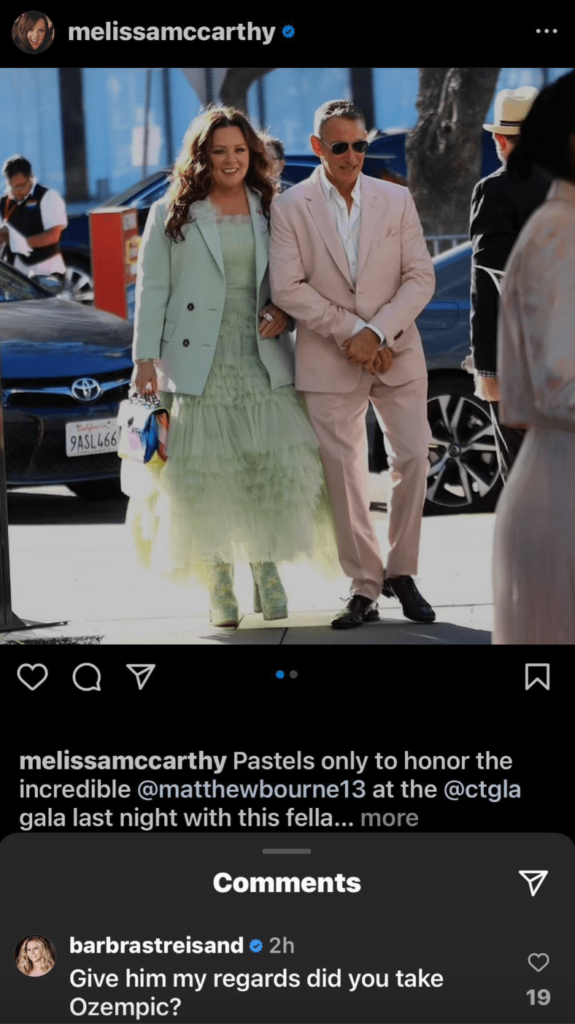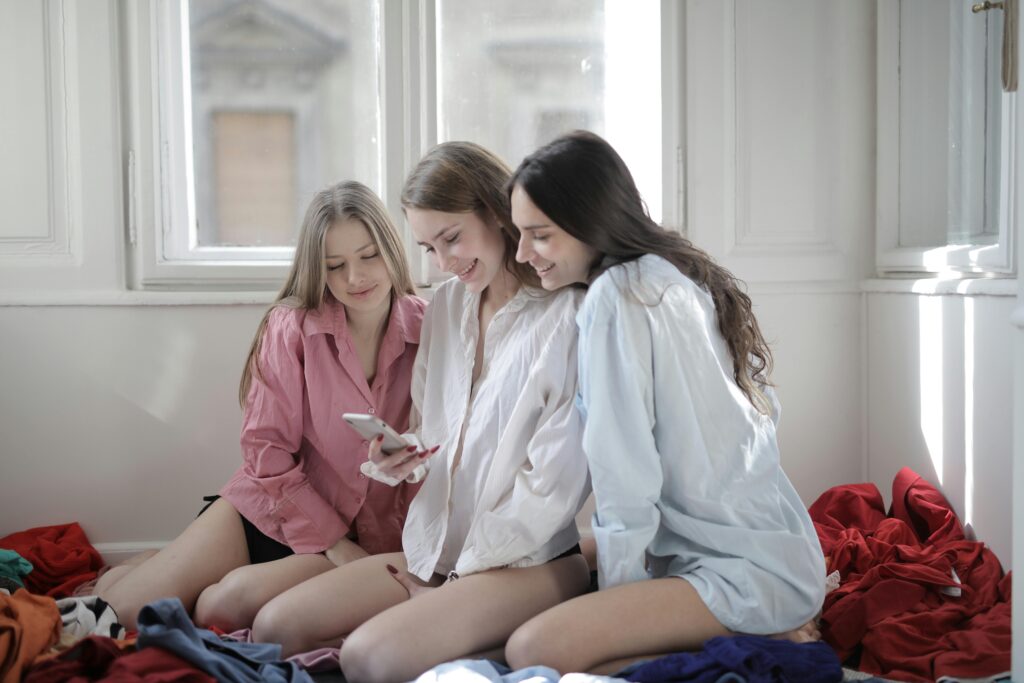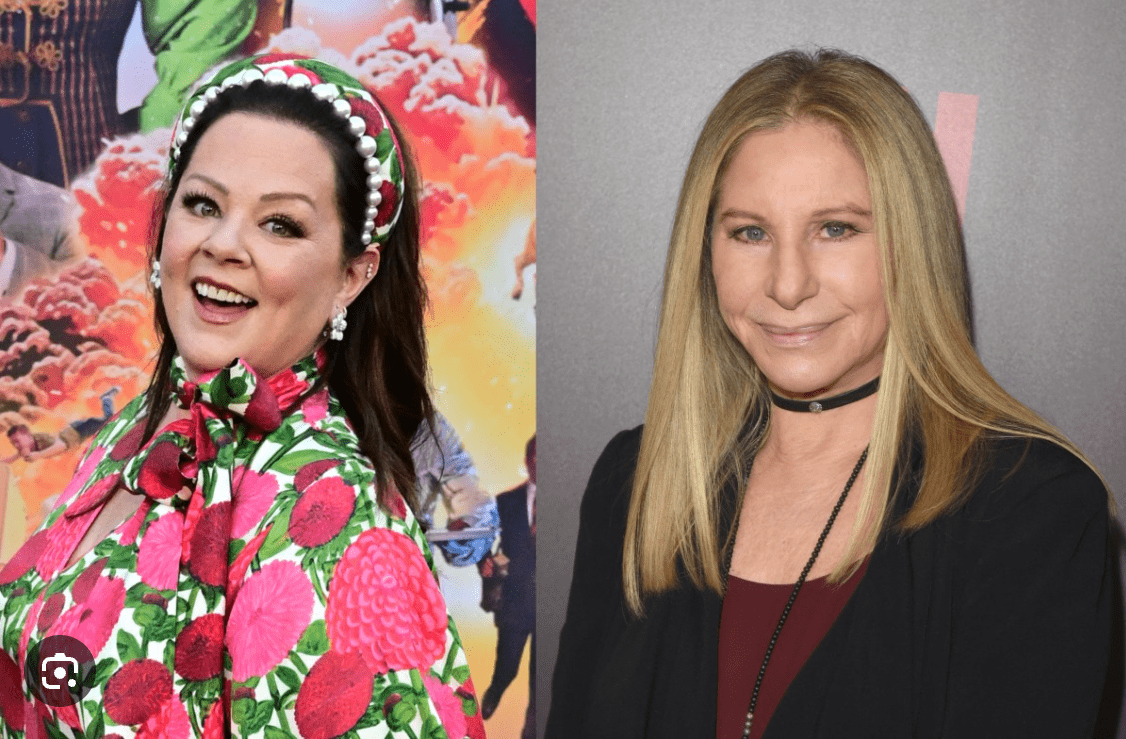Tis the season…
The season for inane marketing campaigns telling you to lose weight in time for bikini season cleverly disguised as “hot girl summer inspo”. But this year, it feels a bit different. Why, you ask? The answer, of course, is Ozempic.
This may not be the first summer that Ozempic is on the tip of everyone’s tongues, but now that it’s been around for a few seasons we’ve entered the next phase of this rapid spiral backwards in diet culture: did she or didn’t she?

Rather than debating the morality of taking a drug intended to help those with legitimate health concerns for ourselves and potentially causing a shortage amongst those that actually need it, this year the internet is having a field day guessing who might be taking the supposed miracle drug.
And this begs the question of today (or at least the question I’m thinking about as I write this particular article) — does someone owe you the truth, or even an answer, as to whether or not they’ve taken Ozempic (or Wegovy or Semaglutide)?
Babs and my icon since her Gilmore Girls days Melissa McCarthy certainly don’t think so.

I think that those of us who have been working on dismantling the (ever-changing, seemingly infinite) structure of diet culture would be quick to throw out a knee jerk hell no response here. And while I understand the instinct to simply shout “you don’t owe anyone an explanation about anything having to do with your body” from the rooftops, hear me out. I think there might be some instances where disclosure is indeed necessary.
As I wade into this debate, I found it helpful to first think about it as lying along a broad spectrum of individuals. On one end, we have everyday people living their lives in relative anonymity. They likely have social media accounts, but just to follow others and connect with their friends. And they have no declared mission or platform that they’re promoting. On the other hand, you have mega-celebrities with hundreds of millions of followers across social media platforms and who theoretically use those platforms to promote something. What that something is, we’ll dig into below.
So let’s start at the first end of this spectrum: the individuals. I certainly don’t believe that any individual owes their (likely very small) following on social media any sort of explanation of their own weight loss. But that isn’t to say that I don’t think individuals don’t owe anyone an explanation of any kind. Hear me out!
In genuine friendships, we often (or at least we used to) seek out those we trusted for advice and input on areas where we might be struggling in our own lives. Part of what has (in my view) damaged the balance of our interpersonal relationships is that we suddenly hold the opinions of randos on the internet in higher regard than those of our own friends. Our actual, irl relationships are the ones that have the deepest context about who we are and, just as importantly, who we want to be. So in the spirit of genuine connections with our loved ones, I think that means that these people deserve more disclosure — even radical honesty, if you will.

A massive caveat to this is that I’m only talking about your actual friendships and relationships with loved ones who are there to support you. I of course wish for each and every one of you to have the loving and supportive relationships with your mothers that I was lucky enough to have. But we all know that often it’s a young woman’s mother (or grandmother, in my case) or even an aunt who actually ends up being the impetus for her own insecurities about her body. If your friends or family fall into this camp, then by all means keep them in the dark about your own decisions about your body. But if you’re contemplating making a radical change — whether that be going vegan, trying a new workout, or seeing if Ozempic is right for you — I hope that you’re willing to discuss your options with the people who know you most deeply and have your best interests at heart.
But we’re in a new era of connection, one where even the biggest celebrities feel suddenly touchable via our phones and social media. Does this change the way we should think about the examples they set for us as individuals? Personally, I think it does. And before we even think about the mega-celebrities and movie stars, let’s start at the smaller end of the spectrum of those that have a public platform…
…the lifestyle influencers.
Lifestyle influencers, from nano to mega, are generally individuals who have built a following based on being relatable in some way to some segment of individuals out in the world. These people are often masquerading as real people — they’re “just like us” in our daily lives and struggles, therefore we should look to them for the same advice and input that we would a close friend (see above).
…but should we?

On the one hand, I think it’s incredible that influencers have been able to pop up in so many niches. There are those in the fashion space who you might follow because their style mirrors your own or you’re looking for shopping tips to level up your wardrobe. The fitness space is rife with individuals claiming they have the perfect workout for “your” body type, or even those that help women figure out how to sync their menstrual cycle with the best workouts for their energy levels that week. There are even influencers that are bringing light to health ailments like PCOS or Hashimoto’s that have been historically overlooked, underfunded, and underdiagnosed.
And that’s amazing! I’m thrilled that people who’ve been made to feel alone all of their lives now have a place to find camaraderie and commiseration where they might otherwise have been isolated. But sometimes that same relatability can be dangerous, leading to a false equivalence that can be discouraging or even harmful to an influencer’s audience (please get actual diagnoses from a doctor! Not your favorite influencer). I’m personally thrilled that we’ve moved beyond the endless “what I eat in a day” influencer videos, because we all know that 1. Everyone’s body is different and responds differently to foods, 2. They were rarely, if ever, genuine snapshots of what this person really ate every day, and 3. I somehow always got sucked in to watch them anyway, hoping to find some magic secret to understanding my body that had thus far eluded me.
But the moral of the story is that these influencers have built a following and now get PAID to do everything they can to make us feel that we’re like them. All the while we’re only seeing a tiny sliver of their lives — the sliver that they choose to show us. That means that they are incentivized to tell us that certain products or decisions will work for us. Not just due to the immediate transactional nature of their jobs, but also to keep up the façade that they’re “relatable” despite their income stream coming from our attention.
So do these influencers owe it to their audiences to disclose it if they undergo certain medical procedures or take a weight loss drug like Ozempic?
In my opinion, as soon as their platform veers into any territory that is predicated on the idea that your audience wants to be like you, then you owe it to that audience to be authentic and honest about your choices. Not about everything, per se! But about the things that go into making that influencer the person that people want to emulate — meaning, the vision you’re trying to sell them.
So my favorite political influencer (hello @emilyinyourphone 👋) has no obligation to tell me anything about her wellness hacks. But the wellness influencer who’s selling the image of a healthy lifestyle that she wants her followers to aspire to? She needs to be more upfront about what goes into creating that life in the first place.
And this brings us all the way over to the other end of the spectrum — the celebrities. I’ll admit, it’s pretty cool that nowadays I can follow and feel connected to some of my favorite actresses, singers, musicians, and artists. These individuals are, by their very nature, aspirational to many. Who hasn’t had a childhood dream to become a rockstar one day (I’m sad to say I let my mom down on this one)? It’s insanely cool to get even a tiny glimpse into what makes their lives so special. But in my opinion, we get that glimpse knowing that their platforms are, by definition, marketing tools. These celebrities are essentially characters that they — and we — have created with their art. And these platforms are tools for them to market that art to the masses. Therefore, in my opinion, they don’t owe us the same level of honesty as, say, mega lifestyle influencers looking to sell us the very products they claim to take to get themselves fit for summer — especially if they’re also taking a weight loss supplement on the side.
But what about those celebrities that choose to venture out of acting/singing/their art into other areas more in line with influencing? Such as Selena Gomez’s Rare Beauty (obsessed with their mascara, btw), Jennifer Aniston’s Lolavie (I use their detangling spray religiously), or Rihanna’s Fenty Beauty (ugh, that highlighter and gloss bomb run out way too quickly). What do they owe us? I think here we can draw a similar line to those of influencers. Namely, as soon as the image that you’re marketing promises your audience that they can be “just like you” in a specific way, then you owe them honesty about how exactly you achieve that yourself.
What do you think? Do you agree that not everyone needs to disclose all of the dirty details of their lives no matter their platform, or do you promote radical transparency? Let’s hear it in the comments.

One response to “Ozempic — Don’t Ask, Don’t Tell?”
Totally agree!
If a person is “promoting or selling” health, fitness, etc, then it wouldn’t be ethical to be anything but transparent and honest with their audience. Talking with close friends, family, (and your favorite doctor) is hopefully the most honest advise one can get.
I am a sceptic when it comes to Ozempic and heard a doctor say, “We really don’t know long term side effects”.
It felt he was saying that to cover his tail … “If or when something goes horribly wrong down the road”.
Question everything! And always trust your own intuition!